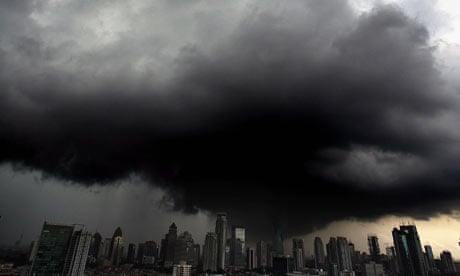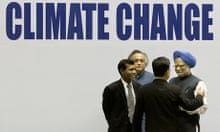Absolutely. It is possible – if we give politicians a cold, hard slap in the face. The fraudulence of the Copenhagen approach – "goals" for emission reductions, "offsets" that render ironclad goals almost meaningless, the ineffectual "cap-and-trade" mechanism – must be exposed. We must rebel against such politics as usual.
Science reveals that climate is close to tipping points. It is a dead certainty that continued high emissions will create a chaotic dynamic situation for young people, with deteriorating climate conditions out of their control.
Science also reveals what is needed to stabilise atmospheric composition and climate. Geophysical data on the carbon amounts in oil, gas and coal show that the problem is solvable, if we phase out global coal emissions within 20 years and prohibit emissions from unconventional fossil fuels such as tar sands and oil shale.
Such constraints on fossil fuels would cause carbon dioxide emissions to decline 60% by mid-century or even more if policies make it uneconomic to go after every last drop of oil.
Improved forestry and agricultural practices could then bring atmospheric carbon dioxide back to 350 ppm (parts per million) or less, as required for a stable climate.
Governments going to Copenhagen claim to have such goals for 2050, which they will achieve with the "cap-and-trade" mechanism. They are lying through their teeth.
Unless they order Russia to leave its gas in the ground and Saudi Arabia to leave its oil in the ground (which nobody has proposed), they must phase out coal and prohibit unconventional fossil fuels.
Instead, the United States signed an agreement with Canada for a pipeline to carry oil squeezed from tar sands. Australia is building port facilities for large increases in coal export. Coal-to-oil factories are being built. Coal-fired power plants are being constructed worldwide. Governments are stating emission goals that they know are lies – or, if we want to be generous, they do not understand the geophysics and are kidding themselves.
Is it feasible to phase out coal and avoid use of unconventional fossil fuels? Yes, but only if governments face up to the truth: as long as fossil fuels are the cheapest energy, their use will continue and even increase on a global basis.
Fossil fuels are cheapest because they are not made to pay for their effects on human health, the environment and future climate.
Governments must place a uniform rising price on carbon, collected at the fossil fuel source – the mine or port of entry. The fee should be given to the public in toto, as a uniform dividend, payroll tax deduction or both. Such a tax is progressive – the dividend exceeds added energy costs for 60% of the public.
Fee and dividend stimulates the economy, providing the public with the means to adjust lifestyles and energy infrastructure.
Fee and dividend can begin with the countries now considering cap and trade. Other countries will either agree to a carbon fee or have duties placed on their products that are made with fossil fuels.
As the carbon price rises, most coal, tar sands and oil shale will be left in the ground. The marketplace will determine the roles of energy efficiency, renewable energy and nuclear power in our clean energy future.
Cap and trade with offsets, in contrast, is astoundingly ineffective. Global emissions rose rapidly in response to Kyoto, as expected, because fossil fuels remained the cheapest energy.
Cap and trade is an inefficient compromise, paying off numerous special interests. It must be replaced with an honest approach, raising the price of carbon emissions and leaving the dirtiest fossil fuels in the ground.
Are we going to stand up and give global politicians a hard slap in the face, to make them face the truth? It will take a lot of us – probably in the streets. Or are we going to let them continue to kid themselves and us and cheat our children and grandchildren?
Intergenerational inequity is a moral issue. Just as when Abraham Lincoln faced slavery and when Winston Churchill faced Nazism, the time for compromises and half-measures is over. Can we find a leader who understands the core issue and will lead?
James Hansen is director of Nasa's Goddard Institute for Space Studies in New York. His latest book is Storms of My Grandchildren.
Ann Daniels: It's too late for the Arctic, but it's not yet too late for us
As a mother of four, I have to believe that we can and will cut global carbon emissions. For 12 years, I have been travelling and working in the polar regions, mainly on the Arctic Ocean.
Over this time, I have completed six expeditions on the Arctic sea ice, sledge-hauling more than 1,500 miles and spending more than 223 days in temperatures well below zero.
During my time "up north", I have witnessed the change in the sea ice covering the Arctic Ocean and experienced more extreme temperatures and unexpected storms.
I have recently returned from the Catlin Arctic Surveycorrect (2009), a scientific expedition to measure the thickness of the ice.
Again, we witnessed a very dynamic and moving sea ice. Our scientific advisers had told us we would encounter older, thicker ice, but the average was relatively thin, at just 1.77m, suggesting it was new ice formed only the previous autumn.
The Arctic sea ice could disappear in the summer some time between 2013 and 2040 and the consequences of this will be catastrophic not only for the indigenous flora and fauna but for weather patterns globally.
Climate change is happening – I have witnessed it first hand – and we simply must do something about it.
We are all looking to the Copenhagen climate change summit to provide the solution, but while it's imperative that the world's leaders show the way, it's up to all of us to take an active interest and to become involved in trying to find a solution.
If we are to have any hope, we need to start now by taking responsibility and trying to reduce our own carbon footprint and give Mother Nature a helping hand.
Do we have hope? I really think we do. We may be too late to halt the melting of the Arctic sea ice but we are not too late to maintain a liveable climate and Earth.
People are now more aware of the damaging impact carbon emissions have on the world and care enough to act.
Ann Daniels is an explorer
Caroline Lucas: Reductions should not be imposed on poor countries
I think there is – but it will take a lot more than hollow promises and handshakes. We need much stronger public pressure and far greater political leadership than we've seen to date.
To have even a 50/50 chance of keeping global temperature rise below two degrees centigrade, industrialised countries need to adopt binding targets to reduce emissions by at least 40% by 2020, based on 1990 levels. These reductions should be made domestically – not outsourced to poorer countries. Significant funding for developing countries also needs to be on the table.
In addition to setting ambitious emissions reduction targets, governments need to facilitate a culture shift and recognise that investing in options to polluting and finite fossil fuels will actually benefit society and the economy, as well as the environment. We also need to change the way we communicate about climate change by painting a much more compelling picture of a healthier, more positive, zero-carbon society.
Politicians must make it easier for people to reduce emissions, through easily achievable initiatives such as smart electricity meters. A nationwide programme of energy efficiency, with warm homes at its heart, could also make a significant impact. There is still hope for achieving – at the very least – clear foundations for a global deal at Copenhagen which finally brings the US on board and stays true to the principles of Kyoto: binding emissions reduction targets, uniform accounting rules, strong compliance mechanisms and common but differentiated responsibility – recognising different historical contributions to the climate crisis. President Obama's attendance indicates that momentum is finally beginning to build.
But perhaps what would make the biggest difference would be a recognition that the impact of climate chaos is likely to be greater than any military threat we have ever faced and therefore demands a commensurate degree of urgency and political will.
Caroline Lucas MEP is leader of the British Green party
President Mohamed Nasheed Despite our predicament, I'm optimistic
The Maldives doesn't look like the front line in a battle. There are no trenches, barbed wire fences or tank traps. The vistas that greet travellers are quite the opposite: Robinson Crusoe islands of swaying palms and snow-soft sand, shimmering azure waters and coral reefs teeming with tropical life.
The Maldives is, nevertheless, a front line state in the climate change battle. My office is just a metre and a half above the sea, which is also the average height of most of our islands. Even modest sea level rises threaten most of the country.
It is, perhaps, our position as a front-line state that enables us to view the climate threat with greater clarity. Rich countries have pledged to halt temperature rises to two degrees and the atmospheric concentration of carbon dioxide to 450 parts per million (ppm). However, less than one degree of warming has unleashed unprecedented climate change, including dramatic polar ice and glacier melt, the spread of mosquito-born diseases and more erratic weather patterns.
Top climatologists, such as James Hansen, now warn atmospheric CO2 must be reduced to 350 ppm, if global catastrophe is to be averted. We're already at 387 ppm. The sort of action necessary to return to 350 is radical: the world needs to quit coal by 2030 and immediately halt tropical deforestation. Fortunately, if we act now, we possess the time, technology and finances needed to solve the crisis.
The Maldives aims to show the way by becoming carbon neutral in 10 years. Since announcing the policy in this newspaper in March, we have signed three agreements with international energy firms to build wind farms. At a recent summit in the Maldives, 10 other developing, front-line states also made a commitment to greening their economies, as their contribution to achieving carbon neutrality.
I believe countries that green their economies today will be tomorrow's winners. These pioneers will save money currently burnt on fossil fuels. They will corner the green markets of the future. Carbon-neutral nations will also have a louder moral voice on the world stage. The only thing holding some countries back is a lack of political will.
I remain, nevertheless, a climate optimist. I believe in humanity and place great faith in the power of people to force change. From the Quit India campaign, to the civil rights movement, to the struggle for democracy in my country: when people mobilise en masse, barriers to change can be removed. We need a similar movement for the climate crisis.
Thankfully, as demonstrated by campaigns such as 10:10 and 350.org, people are already mobilising. It is my belief that in countries where politicians drag their feet, voters will insist on faster action. That way, we can transform our economies, defeat this enemy and bequeath our children a brighter world; richer and more exuberant than the one we inherited.
Mohamed Nasheed is the president of the Republic of Maldives
Dr Benny Peiser: Politicians face scepticism as warming slows
As we get closer to the Copenhagen conference, the chances of a Kyoto-style treaty with legally binding emissions targets is now close to zero. On the issue of global CO2 emission cuts, the gap between the stances of the developed and the developing nations remains as wide as ever.
Nevertheless, the summit is likely to produce a political agreement. It will, most likely, contain fine words and lofty promises, including the pledge that any future warming – should warming commence again at some point in the future – will be limited to no more than a moderate rise of two degrees centigrade. And as always with conferences of this nature, the Copenhagen agreement will be hailed as a historic breakthrough in the fight to save the planet.
In reality, however, the global economic crisis has effectively rendered costly emission reduction policies untenable. Voters are increasingly hostile to green taxes and higher energy prices. The intriguing fact that the global warming trend of the late 20th-century appears to have come to a halt for the time being has led to growing public scepticism about claims of impending climate catastrophe.
In view of what increasingly looks like an unbridgeable stalemate and after years of inflamed global warming alarm, we are beginning to see a period of sobering up, where national interests and economic priorities are overriding environmental concerns and utopian proposals. It seems reasonable to conclude that the diplomatic impasse cannot be overcome in Copenhagen or, indeed, anytime soon. Global CO2 emissions, as a result, will continue to rise inexorably.
What is needed in these circumstances is a calm deceleration strategy that will cool future climate negotiations.
Such a deliberate slow-down could help to lower the political temperature and turn negotiations into routine events, thereby shedding much of their media hype and agitation. It will be crucial for governments around the world to come up with fresh ideas that can lower unrealistic expectations of a quick fix and can manage to direct the permanent climate stalemate for many years to come.
Dr Benny Peiser in director of the Global Warming Policy Foundation
Yang Ailun: It's in the world's interest for China not to fail
Without doubt the answer is yes. Greenpeace China is not alone in saying this. The window of opportunity is closing, but it isn't closed yet.
In China, there are many reasons for optimism. Five years ago, Greenpeace campaigned to get the Chinese government to introduce its first national renewable energy target. In 2005, a target was set for China to have 10% of its energy coming from renewable energy sources by 2010 and 15% by 2020.
The sense I got then was of a government politely nodding its head, waiting to be convinced that renewable energy was worth the effort.
The evidence is now convincing. The deployment of wind energy, for example, is happening so quickly. Over the last four years, the wind power market in China has grown by more than 100% annually and we are expecting another growth in excess of 100% this year. China planned to install 30GW of wind power by 2020 as part of the renewable energy target. Now the government and the wind industry are talking about 100GW of wind by 2020. Every hour, two wind turbines are being made in China.
More solar water-heating systems have been installed in China than the rest of the world put together. And in the last three years, more coal-fired power stations have been closed down than the total electricity capacity of Australia.
A clean energy revolution is taking place in China. The government is behind this because they know it creates jobs, it creates energy security, it reduces China's pollution issues as well as its addiction to coal, and it moves all of us away from climate disaster.
But yet China is still the world's largest producer and consumer of coal, the single biggest cause of climate change. It must, along with every other nation, plan a development path that takes us away from coal, rather than entrenches us further.
Coming from a culture with a history of 5,000 years, I have an appropriate Chinese quote: "Deep doubt, deep wisdom; small doubts, small wisdom." Doubt and uncertainty compel us to deeper wisdom and bigger actions. It is clear that China realises it is in its own interest to become a clean energy superpower. And it is also in the world's interest for China not to fail, as the ramifications of failure will affect all of us.
Yang Ailun is head of climate and energy for Greenpeace China
Joss Garman: It all hinges on Europe
It happened before the Rio Earth Summit and also before Kyoto. Now it's that time again. The most powerful governments in the world are aggressively playing down expectations before Copenhagen, so that if they fail, their populations expected it. On the other hand if they succeed in agreeing something, their voters will cheer.
The reality is that there's a deal there to get but the success of Copenhagen now hinges on Europe. It's all too convenient for the Europeans to point at China, and at America's failures, because it distracts from the reality that our own carbon targets are so pathetic. It's embarrassing that Europe's 2020 goal is so weak that the EU would need to deliberately slow Europe's reductions not to meet it.
In a report out this week, numbers crunched by the McKinsey consultancy show that developing countries are collectively offering a greater reduction in their emissions than the industrialised countries that caused climate crisis and have the greatest ability to pay to solve it.
Poorer countries such as Brazil have boldly offered to cuts their emissions by almost 40%. China, often blamed for not going further, has also put forward plans surpassing the US. President Hu Jintao has already adopted car efficiency standards that Barack Obama only hopes to achieve for the US in 2016. Hu has also signed China up to get 15% of its energy from clean renewable sources by 2020, once again surpassing the US.
If Europe were to promise to cut its emissions by 30% before Copenhagen, it would be a show of good faith and of its expectations for a successful outcome. This would start to redress the imbalance of the poorer countries doing more of the work and would also move the EU closer to the 40% cut that the science says is necessary.
It's been 12 years since the Kyoto protocol was signed and two years since work began on Copenhagen. If Europe's leaders fail to close the gap between the science and the politics and seal the deal, we'll all know it was their fault.
Joss Garman is an environmental activist and blogger at leftfootforward.org
Jessy Tolkan: Only bold action can save us
The road to Copenhagen has been an emotional roller coaster.
Would the United States have passed meaningful legislation by the time of the summit? Would President Obama attend? Would the meeting produce a binding global deal? Would the numbers meet what science requires?
We finally have some important answers. Legislation is more likely to happen in the spring. Obama will attend, although a binding deal is unlikely. And the US has proposed a 17% cut in emissions from 2005 levels by 2020, 30% by 2025, 42% by 2030 and 83% by 2050.
While some may feel the forecast for Copenhagen is not strong enough, we do have a workable base on which to build. For that, we should be optimistic and creatively moving forward.
Compared with US policy over the past 10 years, Obama's commitment to confronting climate and energy issues is significantly more promising than what we experienced under the Bush administration. The summit is a tremendous opportunity to press upon him and his team the need to be more aggressive. To that extent, Copenhagen can be what we make of it.
The framework is still malleable. The carbon reduction targets outlined by the US are below what science tells us is necessary to avoid the most catastrophic impacts of global climate change. However, legislation is pending, and Obama's figures are still subject to adjustment. The leaders of the youth climate movement and beyond are committed to asserting the need for bold action that circumstances necessitate.
The Obama administration has been understandably preoccupied with healthcare but is clearly making climate and energy its next priority. The world might have hoped for solutions in December but we will have to regroup in the spring. Fortunately, the Obama administration is sending signals that it is serious and committed to stopping harmful pollution and building a clean energy economy.
We in the US must work hard to pass a bill domestically that puts a cap on carbon that will allow the US to sign a globally binding agreement as soon as possible.
Jessy Tolkan is executive director of the Energy Action Coalition






